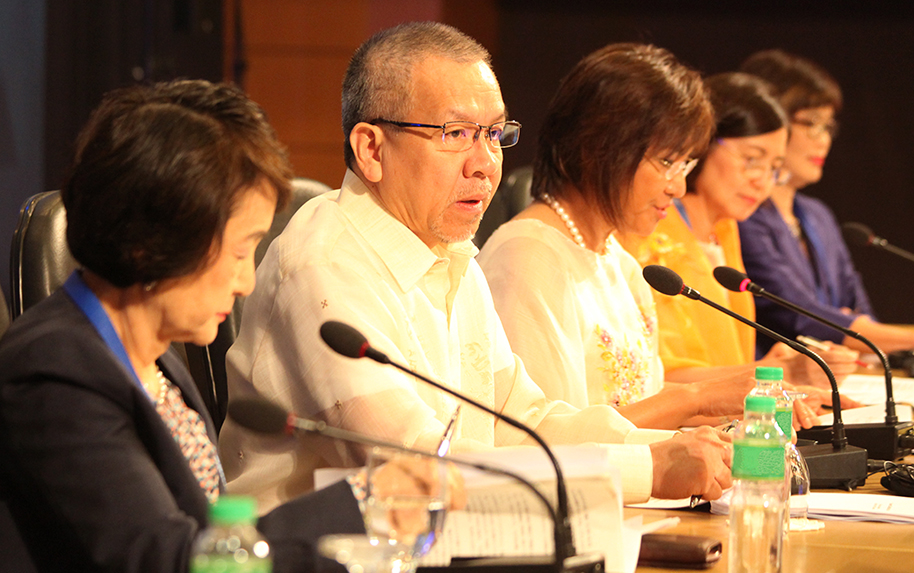More women working means $89B plus yearly
As much as $89 billion can be added yearly to the economies of the Asia-Pacific Economic Cooperation (Apec) if women in the region are allowed to realize their full potential.
“The economic potential of women is immense. In 2010, the United Nations estimated that the Apec region loses up to $47 billion in output each year due to lack of women’s participation in labor markets,” said Trade Secretary Gregory L. Domingo as top-level delegates from 21 member-countries of Apec concluded a three-day summit on Friday with a reinvigorated commitment to promote gender equality to unlock greater economic gains and ensure inclusive growth across the region.
READ: Domingo: Women’s economic participation crucial in boosting Apec region
“In 2012, it was estimated that up to $89 billion could be added to the regional economy when barriers to women’s economic participation are eliminated. There is, thus, a need to mainstream women’s participation in trade fora so their capacity building needs can be addressed,” said Domingo who spoke at the the Apec high-level policy dialogue on women and the economy yesterday.
Apec leaders encouraged all member-countries to take concrete steps toward addressing gender disparities in women’s labor force participation and affirmed a commitment to reduce the gender gap by 25 percent by 2025.
Philippine Trade Undersecretary Nora Terrado, who chaired the Apec We 2015 forum on women and the economy, said all member-countries had reported progress in cutting the gender gap. “We feel confident that we shall reach those goals. We’re on track,” she said.
The gender gap is defined as the level for men minus the level for women in key indicators like labor force, employment, wages or holding of senior management.
The commitment to reduce the gender gap by a quarter by 2025 was originally a goal of the G-20, an informal forum of the world’s largest advanced and emerging economies representing about two-thirds of the world’s population. The same goal was adopted by Apec for its high-level policy dialogue on women and the economy.
“We will work to ensure women’s equal opportunities, participation and benefits in innovative development, economic reform and growth,” said a joint statement issued by Apec ministers, heads of delegations, senior officials, private sector leaders and representatives from nongovernment organizations at the end of the meeting in Manila from Sept. 15 to 18.
The main theme of the Apec We 2015 was “Women as Prime Movers of Inclusive Growth.” It was built on the foundation of the first Apec ministerial meeting on women, also held in Manila in 1998, which paved the way for the drafting of the framework for the integration of women in the Apec agenda. The framework has guided all Apec forums in “mainstreaming” women in Apec processes and activities.
The summit on women recognized that 2015 was a landmark year as the region celebrates the 20th anniversary of the Beijing Declaration and Beijing Platform for Action agreed upon by 189 UN member states during the 4th World Conference on Women in 1995, where investing in gender equality and women’s empowerment was acknowledged.
According to Terrado, the most concrete takeaway from the forum on women was the launch of the Apec Healthy Women, Healthy Economic Policy Toolkit, which seeks to make it easier for governments and businesses in Asia-Pacific to introduce health policies that facilitate the participation of women in economies. It is seen as opening the door to potentially significant improvements in social mobility and growth across the region.
The toolkit details issues, actions and implementing elements for improving women’s health in Apec economies across five categories: workplace health and safety; health access and awareness; work-life balance; sexual and reproductive health; and gender-based violence.
The summit also recognized the “Sendai Framework for Disaster Risk Reduction 2015-2030” adopted by the United Nations. This framework stipulated that women and their participation were critical to effectively manage disaster risk and design, resourcing and implementing gender-sensitive disaster risk reduction policies, plans and programs.
It called for efforts toward promoting business continuity programs to support the recovery of women-owned enterprises after disasters and carry on rebuilding their lives and businesses. Reducing barriers to accessing financial capital and technical assistance as part of business continuity planning is seen to help ensure the recovery of business losses.
According to Domingo, the Philippines has a special advocacy for greater focus on micro, small and medium-sized enterprises (MSMEs), in which a significant number of women are engaged as enterprise owners, managers and workers.
He explained that MSMEs serve as major contributors to innovations in economies, partly through collaborations with the larger firms. MSMEs that have integrated into the supply chains of global firms have also demonstrated improvements in human and technology capital, thus, improving productivity, he said.
This is why Apec has decided to focus on the development of the region’s MSMEs to bolster their ability to take advantage of cross-border business, as the continuing emergence of global value chains and free trade agreements have opened more opportunities for MSMEs across the region, he said.
Apec is a regional economic forum established in 1989 to leverage the growing interdependence of the Asia-Pacific region. Its 21 members are Australia, Brunei, Canada, Chile, Hong Kong, China, Indonesia, Japan, Korea, Malaysia, Mexico, New Zealand, Papua New Guinea, Peru, the Philippines, the Russian Federation, Singapore, Chinese Taipei, Thailand, United States and Vietnam.
The just-concluded summit on women was part of the Philippines’ yearlong hosting of the 2015 Apec conferences, to culminate in the Apec Leaders’ summit in November. This is the second time the Philippines has hosted the Apec meetings. The first was in 1996 during the Ramos administration.
RELATED STORIES
Apec talks ‘women and the economy’
Gender equality promotion in Apec pushed















